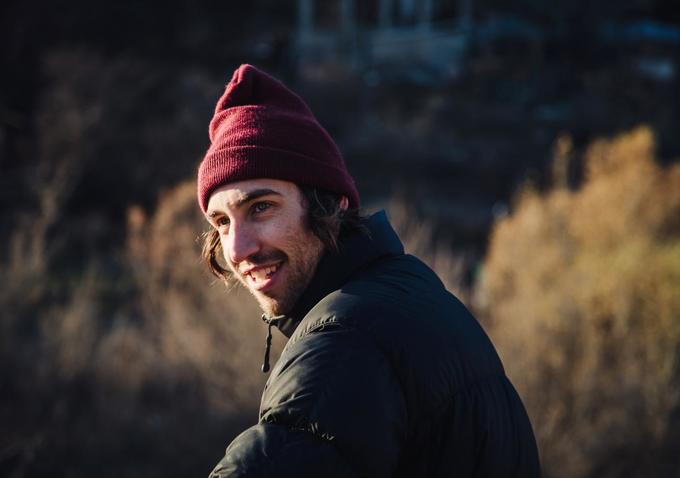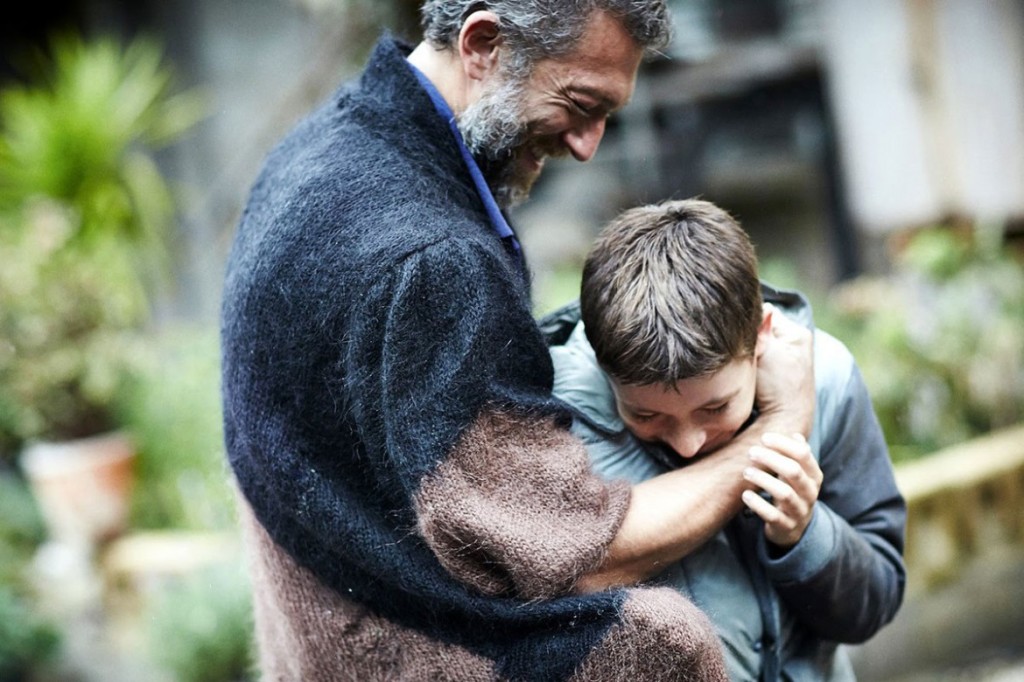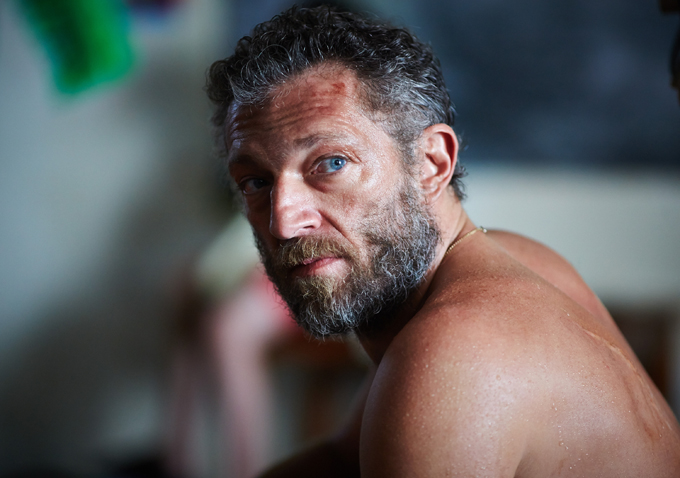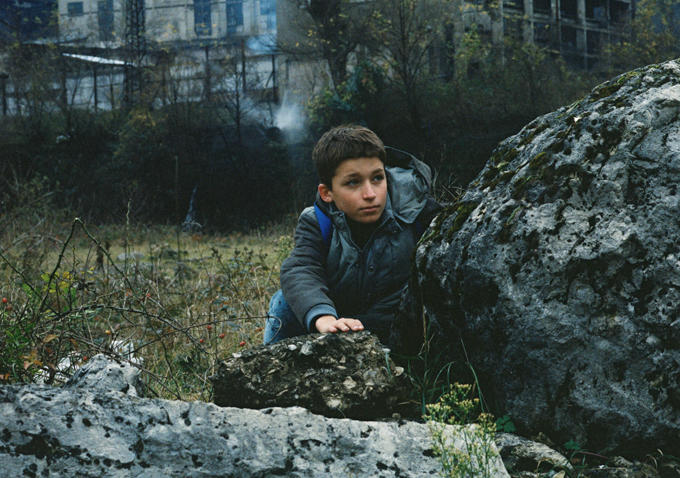Thomas Humphrey chats with Ariel Kleiman, director of the Vincent Cassel-starring drama “Partisan”, which opens this week in the UK.
 Like a number of young Australians his age, writer-director Ariel Kleiman strikes you as something of a well-travelled individual. He seems like the kind of person who was drawn to the bright lights of London in his youth, and was very hungry to sample the cultural experiences it had to offer whilst there. What’s more, he clearly comes across as someone keen to make a bold reputation for himself, and that is something that has definitely translated into his debut feature, Partisan.
Like a number of young Australians his age, writer-director Ariel Kleiman strikes you as something of a well-travelled individual. He seems like the kind of person who was drawn to the bright lights of London in his youth, and was very hungry to sample the cultural experiences it had to offer whilst there. What’s more, he clearly comes across as someone keen to make a bold reputation for himself, and that is something that has definitely translated into his debut feature, Partisan.
Revolving around a mysterious man who starts a polygamous family only to turn his (often adopted) children into well-trained assassins, this compelling film was always going to attract attention, but you certainly can’t help but imagine that securing Vincent Cassel in this lead role probably represented all the director’s dreams coming true at once. And the collaboration between this talented actor-director duo doesn’t seem to have backfired, either, as between them they have definitely produced a film that has some intensely magnetic moments.
Having already returned to London for the film’s UK premiere at last year’s London Film Festival, Kleiman is now also set to release his film across UK cinemas on the 8th of January. Alongside other recent Australian filmmakers like Justin Kurzel, who recently made a big splash on the British scene with Macbeth, Kleiman will continue to show local audiences what a hotbed Australia seems to be for promising, emerging new directors.
Do you think it seems like a very promising time for film in Australia? It seems like Screen Australia in particular has been stewarding the Australian industry very effectively in recent years.
Yeah, totally! I think I’m probably biased, but I think it’s a ridiculously exciting time for Australian films and Australian directors, because they’re doing incredibly well around the world. I mean, it’s a very small industry, so I think the ratio of good to bad films that is coming out of Australia is really pretty unique.
I’ve been lucky enough to travel with my films, too, and in that time I just got this overwhelming feeling that people all around the world are excited about the types of films that are coming out of Australia at the moment.
Were you also very excited to work with Warp Films Australia? It seems they have a very high-quality brand identity attached to them.
Yeah, absolutely. I am a huge fan of the films they have made, and they do have a very strong brand as a company, like you say. So the fact that they were into the script and into the films I’d already made – yeah, that gave me this huge kind of confidence boost.
And was your film also influenced by other recent Australian New Wave films such as “Snowtown”? I suppose both film have a similar kind of grooming process going on in it, for example.
Yeah, totally it does. But it wasn’t like a direct influence or anything like that, when we were making Partisan. By the time Snowtown came out, and by the time we’d seen it, we were already well into writing our film. But there’s totally a similar father-son, highly questionable relationship at the heart of both films.
So is the theme of child indoctrination one that particularly interests you?
Absolutely. I guess we were really interested in the kind of inevitable indoctrination that occurs within a family unit. I suppose that’s why we called the film Partisan, because we were kind of inspired by the literal meaning of the word, which is “devout follower.” So hopefully what the film is saying is that there is no greater devout follower than a child. Up to a certain age, anyway, all that kids soak in is what the adults around them are telling them to do or believe, and that was something I wanted to explore.
What about the sort of low-fi dystopian future you create in your film – was that inspired by previous Australian classics like the original Mad Max films?
So this is pretty embarrassing…but I’ve actually never watched Mad Max. I’ve only watched the most recent one, and that was only like a couple of months ago, so it wasn’t a reference at all for me, really. But yeah, that’s highly embarrassing for me to have to admit. It is hard to keep up with everything, I guess.
So what kind of things have been an influence on your work, do you think?
I tend to find inspiration from all over the place really. For Partisan, the things that come to mind is stuff like Vivian Maeyer’s photography. Her kind of street photography of New York, and the way she photographed kids, that was a big influence on me. But then there’s even just stuff like aging skateboarders, and the kind of physicality they have – they were kind of a real inspiration for Gregori, if you can believe it.
Even people like Mike Tyson. I watched a great documentary about him which proved to be a big inspiration. Cría Cuervos, which was like this Spanish film from the ‘70s by Carlos Saura, something I just happened to walk in on at the BFI when I used to live in London. It just absolutely blew my mind.
What is it like to have lived in London, attended the London Film Festival as a member of the public and now have your film included in its selection?
It’s genuinely been very, very special, because the film was conceived here. We wrote it while we were living here and I think inevitably London made its mark on the screenplay. And like I said when I intro’ed the film at the festival, sometimes some people say they find the film too dark or ominous, but I just tell them that I blame London for that. and I think in a very direct way that darkness came from London’s winter. I definitely blame London for that.
I do live in Australia now, but I definitely hope to move back here soon. It really just felt like London was just one of the most exciting and creatively inspirational cities I’ve ever been in. I mean, the weather is shit as, I’ll be honest with you there [laughs]. But otherwise, I do think it’s one of the coolest cities in the world. It just always seemed to me like there was all the best things from fashion, photography, art and film – from all over Europe – all in one place. So that’s definitely something I’d love to be submerged in again.
And have you already got new projects lined up which are likely to bring you back?
Well, actually I’m just about to join a new project, and that’s going to be the first thing that I’ve directed that I haven’t written myself. But it’s going to be a TV show in Australia.
Are you daunted about potentially making the transition into TV?
Funnily enough, I mentioned the word “TV” to the team who I’m making it with recently, and they found it to be a very dirty word [Giggles]. So in their view they’re really making a film. Or like a kind of mini-series type thing.
It’s supposed to be six episodes long, and we’ll be looking at it like a six-hour film… I mean, it’s literally probably a couple of weeks away from being official, but at this stage I’d probably have to tell you off the record, because I don’t want to get into trouble [Laughs].
Partisan opens in the UK on January 8th.





